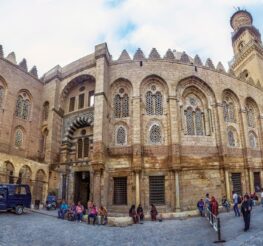
Traditional Palestinian dishes are not easy to come by in Cairo restaurants, but El Owda – a family business run by Gazans – serves up the region’s specialties with meticulous attention to detail and gracious service.
Nestled on a quiet street in Nasr City, the restaurant has a modestly elegant and clean outdoor dining area framed by green plants and trees, and a logo featuring Jerusalem’s gold-topped Dome of the Rock Mosque. There are a few tables inside, but the outdoor area is much more spacious, with half a dozen tables that are set far enough from each other and from the street to ensure comfort and privacy. Traffic is quiet and the atmosphere is relaxed.
We came for the delicious falafel sandwiches (1.50LE), which were made the Levantine way, with chickpeas instead of the fava beans, as used in the Egyptian version. We stayed to order a smorgasbord of various dishes we couldn’t resist.
“Whatever your eye desires”, the Palestinian waiter told us after taking the order.
The falafel sandwiches were crisp and slightly lighter and tangier than the Egyptian taameya. The sausage sandwiches (3LE) were made with finely-minced beef that is so soft that it melts in your mouth and the spinach sambousek (2.50LE) were crunchy on the outside with a chewy and hearty filling. Other options on the menu included minced meat, oregano and cheese sambousak, at 3LE each.
The side dishes at El Owda are the stars of the menu, rather than an afterthought to a meal. The green salad, which looked like an unassuming pile of tomatoes, cucumbers and spring onions, was spectacular. A vinaigrette dressing with a hefty dose of garlic and a hint of cumin brought out the freshness of the vegetables and gave them an extra kick.
Good hummus isn’t easy to come by, and we are mostly forced to buy it in cans from a supermarket and mix it at home. At El Owda, however, we ordered two different delicious varieties to eat with pita bread (baked off-site) and satisfy our craving. At 7LE each, the regular hummus was creamy with a dash of olive oil, while the misabahah version was chunkier with a slightly fuller flavour.
After the meal, we could hardly move, but got up anyways to buy a jar of Sinai olives, said to have a similar flavour to the world-famous Palestinian olives. Pickled vegetables were also available to take-away from the sparklingly-clean kitchen. They ranged in price from assorted pickled vegetables for 5LE, to pickled eggplant stuffed with nuts or makdous, for 40LE.
El Owda, or “the return” in Arabic, is named after the principle that says Palestinian refugees and their descendants have a right to return to what is now Israel. Although that possibility might seem like a pipe-dream to many, this little restaurant in Cairo is sure to bring back at least a taste of home to the refugees who know its flavours and introduce many Egyptians to this tasty cuisine.
Write your review
recommended
 Arts & Culture
Arts & Culture
The Coptic Museum: The History of Egypt to the Tunes of Psalms of David
arts & culture cairo museums +4 Health & Fitness
Health & Fitness
Egyptians in the 2024 Summer Olympics
Egyptians in the Olympics Olympics +1 City Life
City Life
Weekend Guide: Bazar by Sasson, Memo, The Cadillacs, Heya Bazaar, Dou, Nesma Herky & More
Concerts The Weekend Guide +2 Arts & Culture
Arts & Culture

